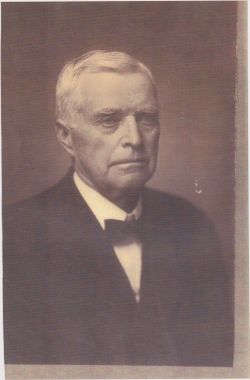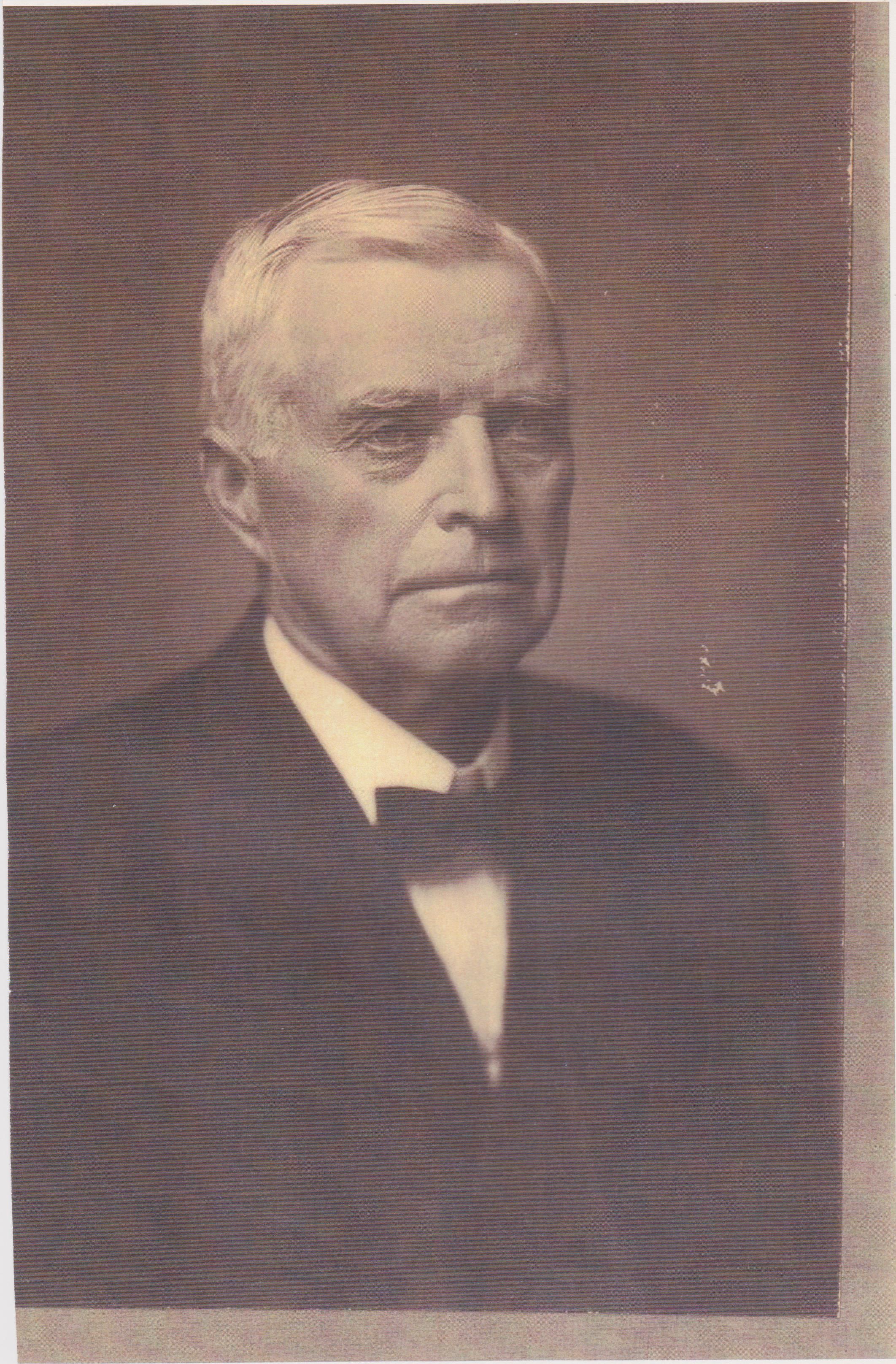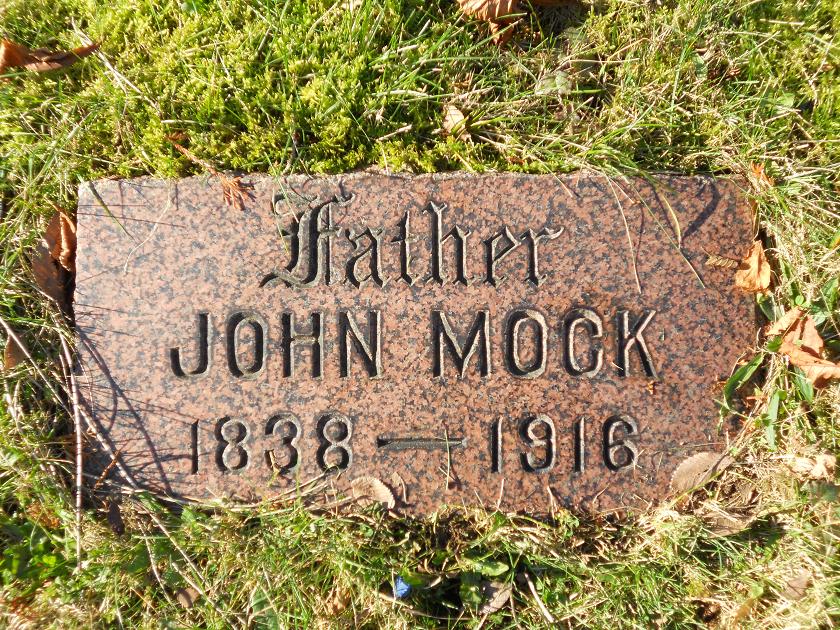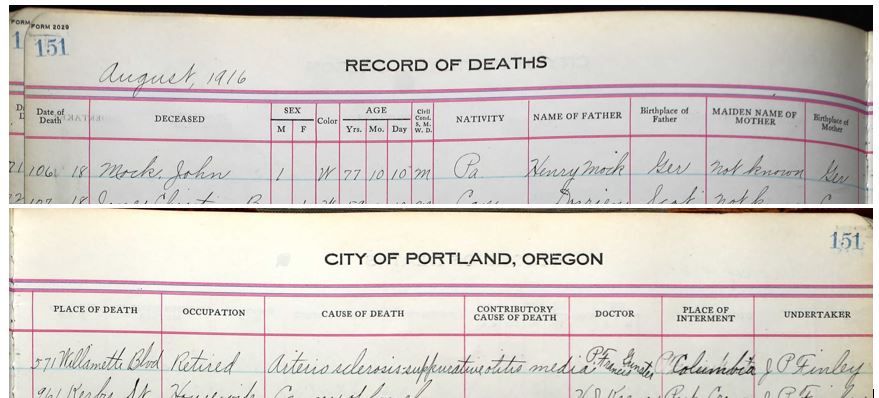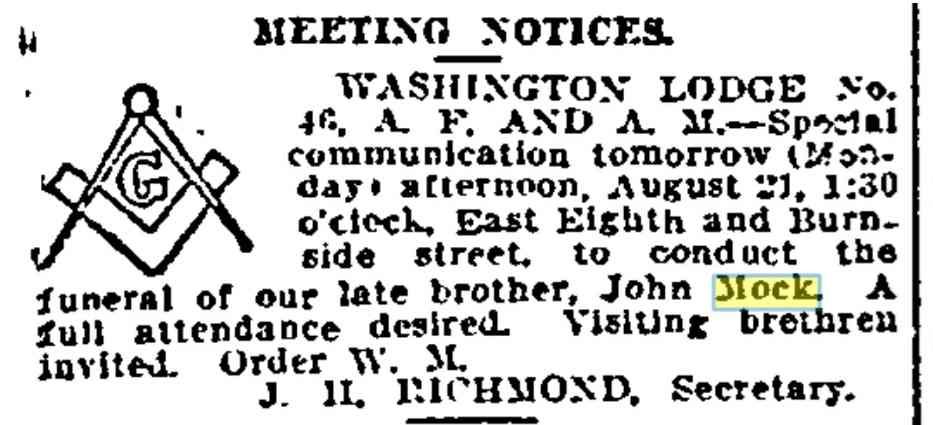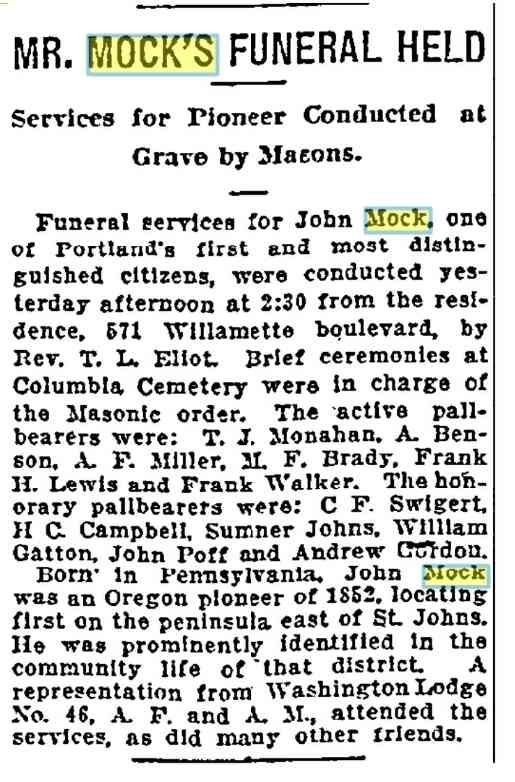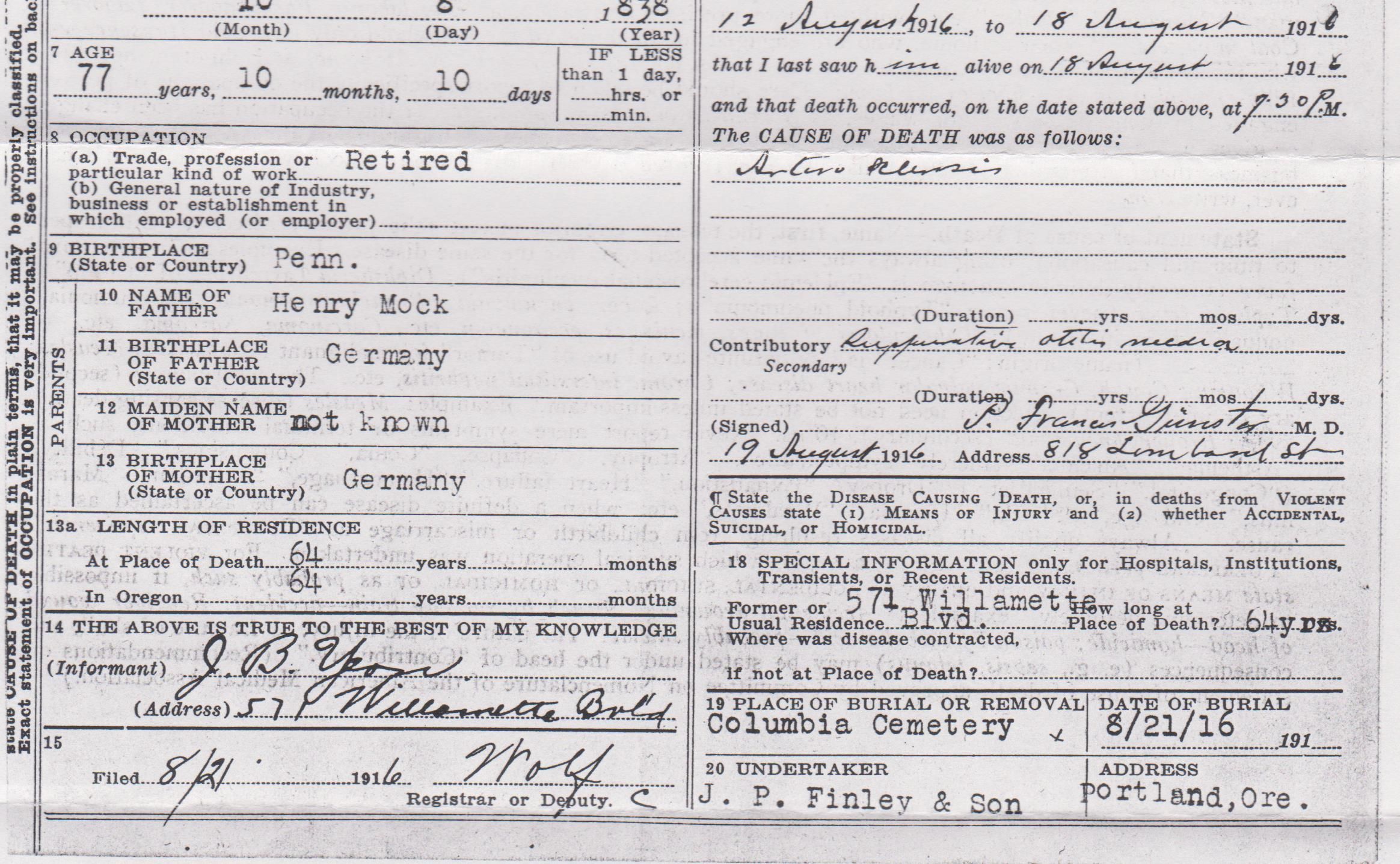Born: October 8, 1838 in Mechanicsburg, Pennsylvania
Died: August 18, 1916 in Multnomah County, Oregon
The year of 1852 was memorable for suffering and hardship endured by the pioneers in their journey across the plains and over the mountains. Cholera broke out among the emigrants, and new graves were made all along the trail. It was in the spring of 1852 that Henry Arnold. Mock started for the west with his family. Henry Mock and his wife Maria Elizabeth were natives of Germany. After coming to America in 1833, they lived for some years in the little town of Mechanicsburg, Pennsylvania. Here, on October 8 was born their son John, the subject of this sketch. When John was six years old, the family removed to Platte County, Missouri, where the father purchased a forty-acre farm. In those days the school facilities of Missouri were limited, but limited though they were, John could not take full advantage of them because farm duties took so much of his time.
In 1852, the Mock family started on its westward journey, and the thirteen-year-old John drove the wagon to which four yoke of oxen were hitched. Occasionally two cows were hitched up with the oxen. Young John handled the animals so well that he succeeded in doing what very few men had accomplished--finishing the trip with the same oxen with which he started.
There were incidents on the journey which are worthy of remembrance. Mr. Mock recalled taking his turn with the men at the night watch, for there was constant danger that the Indians would steal the cattle. On one occasion, when the immigrants were fording the Platte river in Nebraska, John was swept off his feet and would have drowned but for the fact that he could swim. His father was as much astonished as he was overjoyed at his son's escape from death, for John had leaned to swim a few years before that, contrary to the direct command of his father. A time came on their journey when it was found necessary to sacrifice some part of the load to relieve the travel-worn oxen. Henry Mock was unwilling to throw anything away, but John's mother came to the conclusion that the large basket of her finest China would have to be given up. So John, not wishing to let his father know, took the dishes at night and threw them into a lake.
When the family reached The Dalles, Henry Mock sold two yoke of oxen and loaded the wagon upon a scow, on which he and his wife made their way down the Columbia to the Upper Cascades. John followed the trail with the other oxen. He met his parents at the upper Cascades, where the wagon was put together again. They kept the trail to the Lower Cascades, where the household goods were once more loaded on a boat and John was entrusted with the oxen from the Lower Cascades to Sandy. Here he met his parents, the wagon was reloaded, and the family drove on toward Portland. They arrived at their destination in October, 1852.
They camped for three weeks at Sullivan Gulch, where their cattle were turned loose and wandered off. In the search for the animals they came to the present site of St. Johns. Here they met Dr. Caples who induced them to spend the winter with him. (Dr. Caples was the first physician to hang out a sign in Portland). The Mock family occupied one of the buildings on the Doctor's place. In the spring, Henry took up a Donation Land Claim of three hundred and seventeen acres in the district now known as University Park. With the aid of their neighbors, they built their first log cabin, which was the family home until 1874.
Alter securing their claim, they cleared a small patch of land and planted it with seeds, which Maria Elizabeth had brought from the east. The vegetables which they raised, together with ducks and geese that were shot on the bottom part of their land (Mock's Bottom today) constituted their food for the first year. The next year, Henry purchased a hog which was fattened on wild potatoes that grew in the vicinity. John once related that it seemed to him the finest meat he had ever tasted. The cost of living in those early times was very high, flour of an inferior quality, which had been shipped around the Horn, cost ten - twelve dollars a sack.
John Mock told of an exciting incident of those days which he said gave him the greatest fright of his life. In the fall of 1856, he went to the home of a neighbor to spend the evening and did not start on his return until after ten o'clock. He was following the trail through a dark grove when he heard a crack in the bushes and the next instant felt against his hand the cold nose of an animal, He looked but could see nothing of the beast but its eyes, shining like two balls of fire. Having no weapon, he stooped and picked up a stick; then, for fear the stick might be rotten, took out his pocket knife, all the while keeping his gaze fastened on the fiery eyes, ready for any movement, but the creature slunk away. The next day, he learned that the beast was a panther. Some neighbors' dogs took its trail, and it was shot, The animal was a very large one, measuring nine feet from its nose to the tip of its tail.
In the early days, Mr. Mock assisted in clearing, developing and improving the home farm. He left home when he was about eighteen years of age and for six years engaged in mining and running a pack train. He then came to Portland to spend some time with his parents. After the death of his mother in 1867, he bought out his father, who was at that time seventy-four years old. Henry Mock then returned to Germany to visit his old friends, and while there was robbed of all he possessed by a dishonest landlord. At the end of two years, John Mock sent his father money to return to America. The old gentleman did so and lived with his son until his death at the age of ninety-one.
After returning to the farm, John Mock bent his energies toward clearing and improving the place. In 1874, he built a cabin of hewn logs, seventeen by twenty-four feet, This comfortable home was destroyed by fire in 1889 with all of its contents, including family records and many articles which association had rendered of value.
Mr. Mock was married, August 1874, to Miss Mary M. Sunderland, a daughter of Benjamin and Elizabeth Sunderland. The Sunderlands also came across the plains from Iowa, and also arrived in Portland in 1852. The children of Mr. and Mrs. Mock were:
Margaret Elizabeth, the wife of J. B. Yeon,
John Benjamin, the husband of Sarah Vietta Curtis,
Lillie Catherine, the wife of Dr. W. F. Amos, and
Margaret Alice, who never married.
Descendants of John Benjamin and Sarah Vietta Mock, and John and Elizabeth Yeon now live in Oregon, Washington, California, and Texas. (John Yeon II was a noted Portland landscape architect who died in 1994.)
For years, there was no road from St. Johns to Portland, and produce was carried to market by boat. Mr. Mock has lived to witness many notable changes in this section of the country, and he has been an active and generous contributor to its growth and development. He donated the land where the University of Portland now stands (formerly Columbia University). He was largely instrumental in bringing the street railway system to the peninsula. By his liberal granting of land for boulevards, the beauty of the peninsula was much enhanced. John Mock lived in the beautiful Victorian home at University Park (Mock's Mansion) until his death in 1916. He was a 32nd degree Mason, a member of the Mystic Shrine, and a member of the Portland Grange. He served faithfully in offices of public trust. The thirteen year-old pioneer boy who drove his oxen across the plains looked back on a well spent and honorable life.
Manuscript edited from History of Oregon, Pioneer Historical Publishing Company, Chicago, Portland, 1922, vol. II, pp. 738-740. (vol. I, history, by Charles Henry Carey, vol. II & III, biographies, by publisher); Edited by Paul H. Mock, October, 2002, to reflect present day status.
Bio submitted by: P. H. Mock, October, 2002.
Born: October 8, 1838 in Mechanicsburg, Pennsylvania
Died: August 18, 1916 in Multnomah County, Oregon
The year of 1852 was memorable for suffering and hardship endured by the pioneers in their journey across the plains and over the mountains. Cholera broke out among the emigrants, and new graves were made all along the trail. It was in the spring of 1852 that Henry Arnold. Mock started for the west with his family. Henry Mock and his wife Maria Elizabeth were natives of Germany. After coming to America in 1833, they lived for some years in the little town of Mechanicsburg, Pennsylvania. Here, on October 8 was born their son John, the subject of this sketch. When John was six years old, the family removed to Platte County, Missouri, where the father purchased a forty-acre farm. In those days the school facilities of Missouri were limited, but limited though they were, John could not take full advantage of them because farm duties took so much of his time.
In 1852, the Mock family started on its westward journey, and the thirteen-year-old John drove the wagon to which four yoke of oxen were hitched. Occasionally two cows were hitched up with the oxen. Young John handled the animals so well that he succeeded in doing what very few men had accomplished--finishing the trip with the same oxen with which he started.
There were incidents on the journey which are worthy of remembrance. Mr. Mock recalled taking his turn with the men at the night watch, for there was constant danger that the Indians would steal the cattle. On one occasion, when the immigrants were fording the Platte river in Nebraska, John was swept off his feet and would have drowned but for the fact that he could swim. His father was as much astonished as he was overjoyed at his son's escape from death, for John had leaned to swim a few years before that, contrary to the direct command of his father. A time came on their journey when it was found necessary to sacrifice some part of the load to relieve the travel-worn oxen. Henry Mock was unwilling to throw anything away, but John's mother came to the conclusion that the large basket of her finest China would have to be given up. So John, not wishing to let his father know, took the dishes at night and threw them into a lake.
When the family reached The Dalles, Henry Mock sold two yoke of oxen and loaded the wagon upon a scow, on which he and his wife made their way down the Columbia to the Upper Cascades. John followed the trail with the other oxen. He met his parents at the upper Cascades, where the wagon was put together again. They kept the trail to the Lower Cascades, where the household goods were once more loaded on a boat and John was entrusted with the oxen from the Lower Cascades to Sandy. Here he met his parents, the wagon was reloaded, and the family drove on toward Portland. They arrived at their destination in October, 1852.
They camped for three weeks at Sullivan Gulch, where their cattle were turned loose and wandered off. In the search for the animals they came to the present site of St. Johns. Here they met Dr. Caples who induced them to spend the winter with him. (Dr. Caples was the first physician to hang out a sign in Portland). The Mock family occupied one of the buildings on the Doctor's place. In the spring, Henry took up a Donation Land Claim of three hundred and seventeen acres in the district now known as University Park. With the aid of their neighbors, they built their first log cabin, which was the family home until 1874.
Alter securing their claim, they cleared a small patch of land and planted it with seeds, which Maria Elizabeth had brought from the east. The vegetables which they raised, together with ducks and geese that were shot on the bottom part of their land (Mock's Bottom today) constituted their food for the first year. The next year, Henry purchased a hog which was fattened on wild potatoes that grew in the vicinity. John once related that it seemed to him the finest meat he had ever tasted. The cost of living in those early times was very high, flour of an inferior quality, which had been shipped around the Horn, cost ten - twelve dollars a sack.
John Mock told of an exciting incident of those days which he said gave him the greatest fright of his life. In the fall of 1856, he went to the home of a neighbor to spend the evening and did not start on his return until after ten o'clock. He was following the trail through a dark grove when he heard a crack in the bushes and the next instant felt against his hand the cold nose of an animal, He looked but could see nothing of the beast but its eyes, shining like two balls of fire. Having no weapon, he stooped and picked up a stick; then, for fear the stick might be rotten, took out his pocket knife, all the while keeping his gaze fastened on the fiery eyes, ready for any movement, but the creature slunk away. The next day, he learned that the beast was a panther. Some neighbors' dogs took its trail, and it was shot, The animal was a very large one, measuring nine feet from its nose to the tip of its tail.
In the early days, Mr. Mock assisted in clearing, developing and improving the home farm. He left home when he was about eighteen years of age and for six years engaged in mining and running a pack train. He then came to Portland to spend some time with his parents. After the death of his mother in 1867, he bought out his father, who was at that time seventy-four years old. Henry Mock then returned to Germany to visit his old friends, and while there was robbed of all he possessed by a dishonest landlord. At the end of two years, John Mock sent his father money to return to America. The old gentleman did so and lived with his son until his death at the age of ninety-one.
After returning to the farm, John Mock bent his energies toward clearing and improving the place. In 1874, he built a cabin of hewn logs, seventeen by twenty-four feet, This comfortable home was destroyed by fire in 1889 with all of its contents, including family records and many articles which association had rendered of value.
Mr. Mock was married, August 1874, to Miss Mary M. Sunderland, a daughter of Benjamin and Elizabeth Sunderland. The Sunderlands also came across the plains from Iowa, and also arrived in Portland in 1852. The children of Mr. and Mrs. Mock were:
Margaret Elizabeth, the wife of J. B. Yeon,
John Benjamin, the husband of Sarah Vietta Curtis,
Lillie Catherine, the wife of Dr. W. F. Amos, and
Margaret Alice, who never married.
Descendants of John Benjamin and Sarah Vietta Mock, and John and Elizabeth Yeon now live in Oregon, Washington, California, and Texas. (John Yeon II was a noted Portland landscape architect who died in 1994.)
For years, there was no road from St. Johns to Portland, and produce was carried to market by boat. Mr. Mock has lived to witness many notable changes in this section of the country, and he has been an active and generous contributor to its growth and development. He donated the land where the University of Portland now stands (formerly Columbia University). He was largely instrumental in bringing the street railway system to the peninsula. By his liberal granting of land for boulevards, the beauty of the peninsula was much enhanced. John Mock lived in the beautiful Victorian home at University Park (Mock's Mansion) until his death in 1916. He was a 32nd degree Mason, a member of the Mystic Shrine, and a member of the Portland Grange. He served faithfully in offices of public trust. The thirteen year-old pioneer boy who drove his oxen across the plains looked back on a well spent and honorable life.
Manuscript edited from History of Oregon, Pioneer Historical Publishing Company, Chicago, Portland, 1922, vol. II, pp. 738-740. (vol. I, history, by Charles Henry Carey, vol. II & III, biographies, by publisher); Edited by Paul H. Mock, October, 2002, to reflect present day status.
Bio submitted by: P. H. Mock, October, 2002.
Family Members
Sponsored by Ancestry
Advertisement
Advertisement
